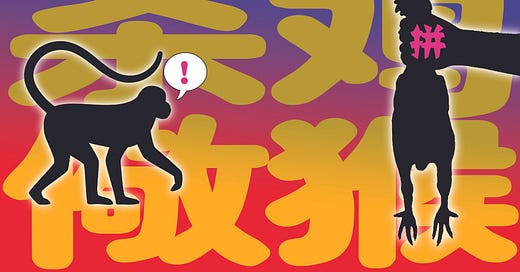‘Killing the chickens to warn the monkeys’ — phrase of the week #102
Internet giant PDD sends a warning to employees
Our phrase of the week is: “Killing the chicken to warn the monkeys” (杀鸡儆猴 shājī jǐnghóu).
Context
A former employee of Chinese online retailer, Pinduoduo 拼多多 pīnduōduō (PDD), is being sued by the company, accused of violating the non-compete agreement in their employment contract.
The employee, Lù Zhī 陆枝, is alleged to have joined a competitor of PDD within the restricted period of her non-compete agreement. She had only worked for company for eight months, in an entry level position, on a relatively low salary.
Non-compete agreements (竞业协议 jìngyè xiéyì) are common in China's competitive internet industry.
But Lu Zhi argues that non-compete provisions are too restrictive, and applied too broadly across all levels of employees, not just senior staff. Leaving the company means there’s no option but to move into another sector, even for people who worked in junior roles like her.
Many other former employees of PDD are facing similar legal battles with the internet giant. Discussions on social media and in legal circles in China this week point to how the non-compete clauses are being used to intimate low-level employees.
In June 2023, when Chen Xin resigned, the HR initiated the non-compete agreement citing that he "set a very bad example". Chen Xin speculated that it was because there were too many resignations during that period, and the HR wanted to reduce the employee turnover rate by "killing the chickens to warn the monkeys".
2023年6月份,陈鑫提出离职时,hr却以“起了很坏的带头作用”为由,对其发起竞业。陈鑫猜测,是因为那段时间离职的人数过多,hr 想要“杀鸡儆猴”,降低员工的离职率。
2023 nián 6 yuè fèn, Chén Xīn tíchū lízhí shí, HR què yǐ "qǐle hěnhuài de dàitóu zuòyòng" wéi yóu, duì qí fāqǐ jìngyè. Chén Xīn cāi cè, shì yīnwèi nàduàn shíjiān lízhí de rénshù guòduō, HR xiǎngyào "shā jī jǐng hóu", jiàngdī yuángōng de lízhílǜ.
And with that we have our Sinica Phrase of the Week!
What it means
"Killing the chickens to warn the monkeys" is a four character idiom. It directly translates as: "kill chickens" (杀鸡 shājī), "warn monkeys" (儆猴 jǐnghóu).
It's a shorter version of a longer colloquial phrase, "kill the chickens for the monkey to see" (杀鸡给猴看 shājī gěi hóu kàn), which is more commonly used in spoken Chinese.
It is said that monkeys are afraid of the sight of blood. According to a grim Chinese legend, when monkey trainers catch a wild monkey, the first step is to kill a chicken in front of it to instill fear, before it is tamed and trained.
There is no clear source for this idiom, with a number of potential historical stories linked to its figurative meaning.
In modern Chinese it means to "serve as a warning to others" or make an example of somebody to deter others who might follow the same behavior. Another idiom which means the same thing is "punishing the wrongdoer to warn others against following suit" (以儆效尤 yǐjǐng xiàoyóu).
Strict non-compete clauses are just one way ruthless internet giants, such as PDD, strike fear into their workforce.
The recent media attention on PDD and its use of non-compete clauses is creating pressure on the company to change its practices.
Andrew Methven is the author of RealTime Mandarin, a resource to helping you learn contemporary Chinese in context, maintain and improve your Mandarin skills, and stay on top of the latest language trends in China.





